|
|
|
Sort Order |
|
|
|
Items / Page
|
|
|
|
|
|
|
| Srl | Item |
| 1 |
ID:
114708
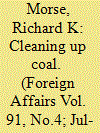

|
|
|
|
|
| Publication |
2012.
|
| Summary/Abstract |
Coal, the rock that fueled the industrial age, is once again remaking the global energy landscape. Over the past decade, while most of the world stood transfixed by the gyrations of the oil markets, the promise of alternative energy, and the boom in cheap natural gas, coal left all other forms of energy in its dust, contributing nearly as much total energy to the global economy as every other source combined.
|
|
|
|
|
|
|
|
|
|
|
|
|
|
|
|
| 2 |
ID:
114700
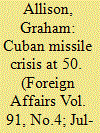

|
|
|
|
|
| Publication |
2012.
|
| Summary/Abstract |
Fifty years ago, the Cuban missile crisis brought the world to the brink of nuclear disaster. During the standoff, U.S. President John F. Kennedy thought the chance of escalation to war was "between 1 in 3 and even," and what we have learned in later decades has done nothing to lengthen those odds. We now know, for example, that in addition to nuclear-armed ballistic missiles, the Soviet Union had deployed 100 tactical nuclear weapons to Cuba, and the local Soviet commander there could have launched these weapons without additional codes or commands from Moscow. The U.S. air strike and invasion that were scheduled for the third week of the confrontation would likely have triggered a nuclear response against American ships and troops, and perhaps even Miami. The resulting war might have led to the deaths of 100 million Americans and over 100 million Russians.
|
|
|
|
|
|
|
|
|
|
|
|
|
|
|
|
| 3 |
ID:
114706


|
|
|
|
|
| Publication |
2012.
|
| Summary/Abstract |
As Iran continues its pursuit of a nuclear capability, outside observers have debated just how worried the world should be. Optimists argue that since nuclear war would be suicidal, no government would ever risk it, and they think the Islamic Republic would be no exception. Pessimists argue that Iran's radical and unstable regime might behave in unpredictable ways and cannot be trusted. Both camps seem to agree that rationality is the key to deterrence; they disagree over whether a nuclear Iran would be rational.
|
|
|
|
|
|
|
|
|
|
|
|
|
|
|
|
| 4 |
ID:
114702
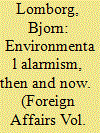

|
|
|
|
|
| Publication |
2012.
|
| Summary/Abstract |
Forty years ago, the Club of Rome produced a best-selling report warning humanity that its escalating wants were on a collision course with the world's finite resources and that the only way to avoid a crash was to stop chasing economic growth. The predictions proved spectacularly wrong. But the environmental alarmism they engendered persists, making it harder for policymakers to respond rationally to real problems today.
|
|
|
|
|
|
|
|
|
|
|
|
|
|
|
|
| 5 |
ID:
114699


|
|
|
|
|
| Publication |
2012.
|
| Summary/Abstract |
Two decades ago, when the European currency system was last on the brink of collapse, the ultimate question was how much Germany, the continent's economic powerhouse, would do to save it. The peripheral economies were hurting, weighed down by a monetary policy that was appropriate for Germany but too austere for weaker European countries. Germany's central bank, the Bundesbank, had to make a choice. It could continue to set high interest rates, thus upholding its commitment to stable prices. Or it could cut rates and accept modest inflation -- and so save the rest of Europe from a prolonged recession.
|
|
|
|
|
|
|
|
|
|
|
|
|
|
|
|
| 6 |
ID:
114705
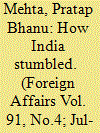

|
|
|
|
|
| Publication |
2012.
|
| Summary/Abstract |
When the United Progressive Alliance, a group of center-left parties led by the Indian National Congress, came to power for a second term in 2009, it seemed that India could do no wrong. The economy had sailed through the worst of the global economic recession with GDP growing at a fast seven percent annually and accelerating (it reached 10.4 percent in 2010). Inflation was low, officials were finally starting to take India's social problems seriously, and politics in the world's largest democracy were contentious but robust. The rest of the world was even looking to the country as a serious global power. "India is not simply emerging," U.S. President Barack Obama told the Indian parliament in November 2010; "India has emerged."
|
|
|
|
|
|
|
|
|
|
|
|
|
|
|
|
| 7 |
ID:
114707


|
|
|
|
|
| Publication |
2012.
|
| Summary/Abstract |
On October 19, 2011, the government of Afghanistan -- acting in part on the recommendation of U.S. military advisers working with the Afghan Ministry of Mines -- granted a license to the China National Petroleum Corporation (CNPC) to develop several oil fields in northern Afghanistan. Just three years earlier, another state-owned Chinese company, the China Metallurgical Group Corporation, won the rights to develop Afghanistan's Aynak copper deposit, one of the largest in the world, again with American acquiescence.
|
|
|
|
|
|
|
|
|
|
|
|
|
|
|
|
| 8 |
ID:
114704
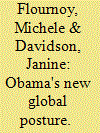

|
|
|
|
|
| Publication |
2012.
|
| Summary/Abstract |
Tough economic times are often met in Washington with calls for retrenchment. But for decades, write two former top Pentagon officials, long-term forward deployments of U.S. forces and robust alliances have guaranteed stability and uninterrupted trade, the very conditions the United States needs for economic prosperity. The Obama administration gets it.
|
|
|
|
|
|
|
|
|
|
|
|
|
|
|
|
| 9 |
ID:
114703
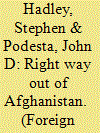

|
|
|
|
|
| Publication |
2012.
|
| Summary/Abstract |
As the United States prepares to exit Afghanistan, it is focusing too much on security, overlooking the political elements of the transition, write two former senior U.S. officials. To leave behind a stable government in 2014, Washington needs to push harder for electoral reforms, negotiations with the Taliban, and a regional settlement involving Pakistan.
|
|
|
|
|
|
|
|
|
|
|
|
|
|
|
|
| 10 |
ID:
114701
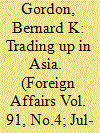

|
|
|
|
|
| Publication |
2012.
|
| Summary/Abstract |
The Trans-Pacific Partnership, a massive multilateral trade agreement now in the works that focuses on the Asia-Pacific region, could add billions of dollars to the U.S. economy and solidify Washington's commitment to the Pacific. But if the Obama administration fails to calm critics of the deal, there is a growing possibility that it could collapse.
|
|
|
|
|
|
|
|
|
|
|
|
|
|
|
|
| 11 |
ID:
114698


|
|
|
|
|
| Publication |
2012.
|
| Summary/Abstract |
The past several months have witnessed a heated debate over the best way for the United States and Israel to respond to Iran's nuclear activities. As the argument has raged, the United States has tightened its already robust sanctions regime against the Islamic Republic, and the European Union announced in January that it will begin an embargo on Iranian oil on July 1. Although the United States, the EU, and Iran have recently returned to the negotiating table, a palpable sense of crisis still looms.
|
|
|
|
|
|
|
|
|
|
|
|
|
|
|
|
|
|
|
|
|